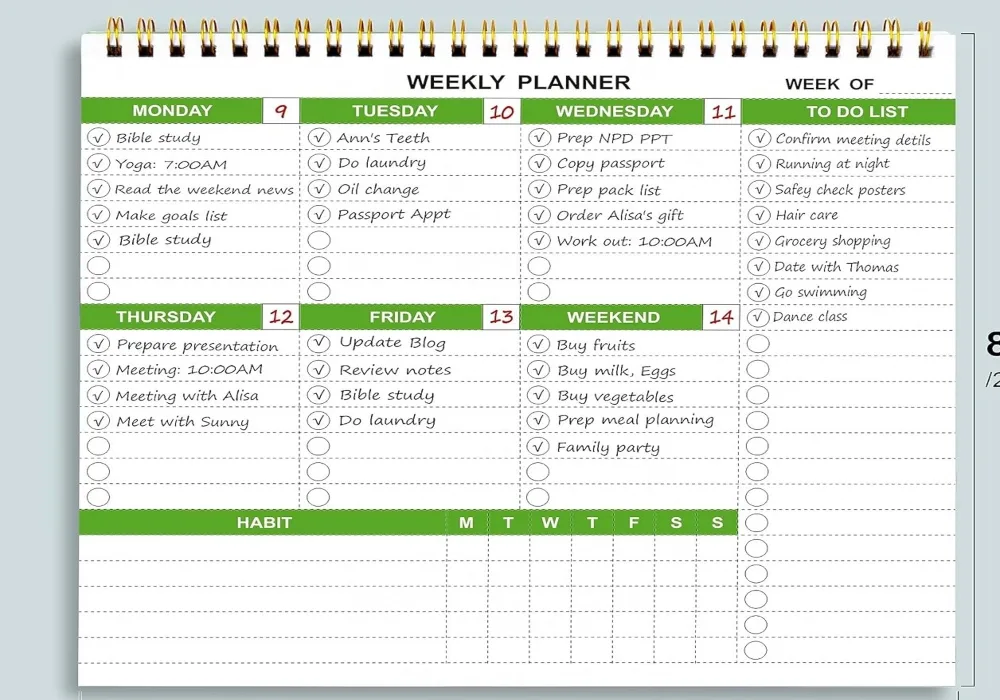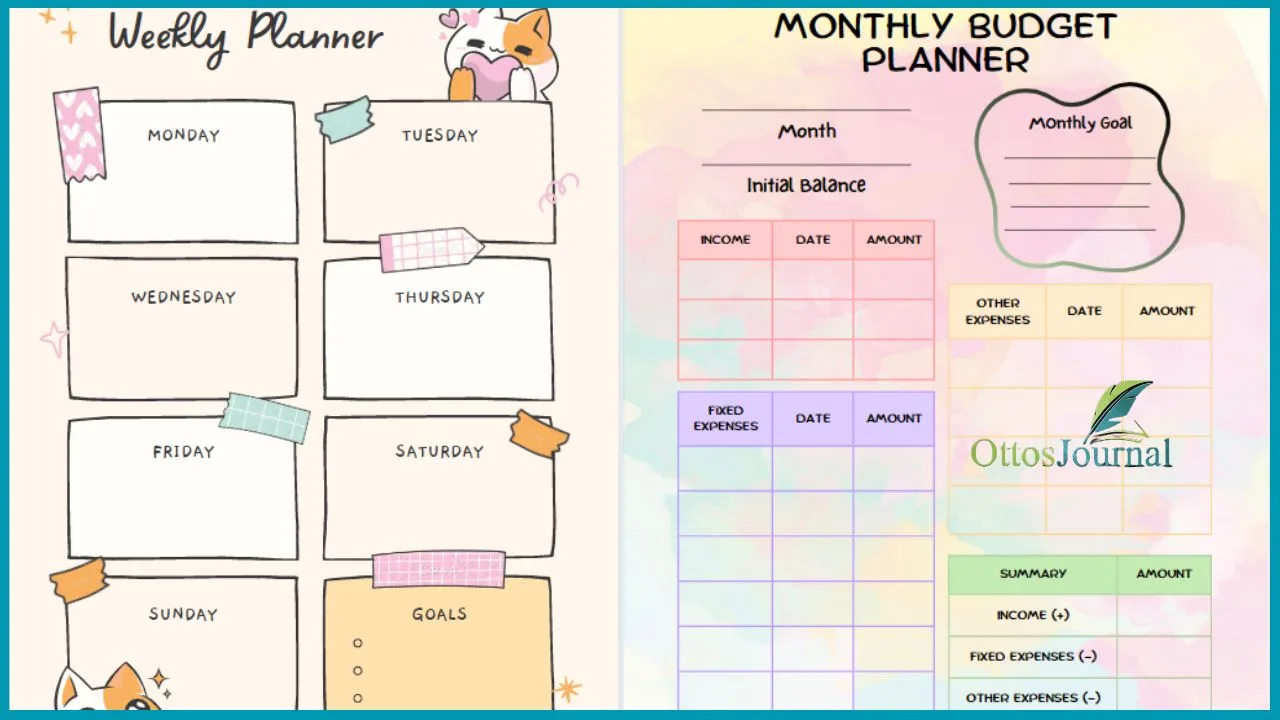Self-care is a crucial aspect of well-being, and it is essential to incorporate it into daily routines. A self-care planner is a useful tool that can help individuals track their habits and create a routine that promotes their well-being. The planner can be customized to suit individual needs and preferences, making it an effective way to embark on a self-care journey. In this blog post, I will share with you 35 self care planner ideas for creating a personal self-care routine.
There are various self-care planner ideas that individuals can use to create a routine that works for them. For instance, the planner can include self-care goals, a daily/weekly/monthly layout, activity ideas, progress trackers, reflection and journaling prompts, inspirational quotes or affirmations, and gratitude practices. The planner can be personalized with art and quotes that resonate with the individual, making it a unique and enjoyable experience.
Creating a self-care planner is an excellent way to cultivate positive habits and promote well-being. With the right ideas and tools, individuals can embark on a self-care journey that supports their physical, mental, and emotional health. The planner can serve as a reminder to prioritize self-care and can help individuals develop a routine that promotes their overall well-being.
Designing Your Self-Care Planner
Designing a self-care planner can be a fun and creative process that enables an individual to prioritize their self-care goals and activities. Here are a few tips to design a self-care planner that suits one’s personality and preferences.
Choosing the Right Format
The first step in designing a self-care planner is to choose the format that works best for the individual. A planner can take many forms, such as a bullet journal, a digital planner, or a pre-made planner.
The choice of format depends on the individual’s preference, creativity, and lifestyle. A bullet journal provides a blank canvas for creativity, while a pre-made planner offers structure and convenience. A digital planner can be accessed on-the-go and customized to one’s liking.
Visual Elements and Inspiration
Visual elements and inspiration are crucial components of a self-care planner. The planner should be aesthetically pleasing and inspire the individual to engage in self-care activities. Incorporating art, color, and inspirational quotes can enhance the visual appeal of the planner. Pinterest and Instagram are great sources of inspiration for self-care planner spreads. The individual can also draw inspiration from their favorite books, movies, or hobbies.
Incorporating Personal Goals
The self-care planner should reflect the individual’s personal goals and aspirations. The planner should include sections for daily, weekly, and monthly self-care goals. The goals can range from physical self-care activities, such as exercise and healthy eating, to mental self-care activities, such as meditation and journaling. The planner should also have space for tracking progress and reflecting on achievements.
Designing a self-care planner requires creativity, inspiration, and personalization. The individual should choose a format that suits their lifestyle, incorporate visual elements and inspiration, and reflect on their personal goals and aspirations. By following these tips, the individual can design a self-care planner that promotes their well-being and enhances their quality of life.
35 Self-care planner ideas

- Morning routine planner: Design a morning routine that includes time for meditation, stretching, or a healthy breakfast to start your day positively.
- Daily exercise log: Keep track of your physical activities to ensure you’re staying active and meeting your fitness goals.
- Meal prep schedule: Plan your meals for the week to maintain a balanced diet and save time on busy days.
- Hydration tracker: Monitor your daily water intake to stay hydrated and improve overall health.
- Sleep diary: Record your sleep patterns to ensure you’re getting enough rest and identify factors affecting your sleep quality.
- Mood tracker: Note your mood throughout the day to identify triggers and patterns in your emotional well-being.
- Gratitude journal: Write down things you’re thankful for each day to cultivate a positive mindset.
- Personal goals section: Set and review personal goals regularly to stay focused on what’s important to you.
- Affirmations and quotes: Include uplifting affirmations and quotes to inspire and motivate you.
- Hobby schedule: Allocate time for hobbies and interests that bring you joy and relaxation.
- Mindfulness practices: Incorporate mindfulness exercises like deep breathing or visualization to reduce stress.
- Self-reflection prompts: Use prompts to encourage introspection and personal growth.
- Social connection tracker: Plan and record social activities to maintain healthy relationships.
- Self-care checklist: Create a list of self-care activities to tick off throughout the week.
- Therapy notes: Keep notes from therapy sessions to track your mental health journey.
- Medication and supplement log: Monitor your intake of medications and supplements to stay on top of your health regimen.
- Creativity corner: Dedicate a space for drawing, writing, or other creative expressions as a form of self-care.
- Digital detox planner: Schedule regular breaks from digital devices to reduce screen time and improve mental health.
- Stress reduction strategies: List and practice techniques like journaling or yoga to manage stress effectively.
- Personal finance tracker: Keep an eye on your spending and savings to reduce financial stress.
- Self-care goals: Define what self-care means to you and set specific, achievable goals.
- Boundary setting: Reflect on and plan how to set healthy boundaries in your personal and professional life.
- Self-compassion exercises: Include activities that promote kindness and forgiveness towards yourself.
- Nature time planner: Schedule time outdoors to connect with nature and boost your mood.
- Beauty routine: Track your skincare or grooming routines to ensure you’re taking care of your physical appearance.
- Learning and development: Plan for continued learning, whether through online courses or reading, to stimulate your mind.
- Health check-up reminders: Keep track of medical appointments, screenings, and check-ups.
- Relaxation techniques: Record different relaxation methods like baths, massages, or aromatherapy to unwind.
- Nutrition tracker: Log your food intake to ensure you’re getting the necessary nutrients.
- Home environment audit: Assess and improve your living space for a more calming and supportive environment.
- Journaling space: Dedicate a section for free writing to express thoughts and feelings.
- Time management strategies: Implement and refine time management techniques to create more space for self-care.
- Self-improvement plan: Outline areas for self-improvement and steps to take to work on them.
- Energy level monitor: Track your energy levels to better understand your body’s rhythms and needs.
- Acts of kindness log: Record acts of kindness you give and receive to foster a sense of community and connection.
Each of these self-care planner ideas is designed to help you focus on different aspects of your well-being. Whether it’s maintaining physical health, nurturing emotional resilience, or fostering personal growth, incorporating these elements into your planner can create a comprehensive self-care routine that supports a balanced and fulfilling life.
Essential Self-Care Planner Categories

Self-care is essential for maintaining overall health and well-being. It is a practice that involves taking care of oneself physically, mentally, emotionally, spiritually, and socially. By prioritizing self-care, individuals can improve their relationships, reduce stress, and increase their overall happiness.
Physical Health
Physical health is an essential aspect of self-care. It involves taking care of one’s body through regular exercise, proper nutrition, and adequate sleep. By prioritizing physical health, individuals can improve their overall health and reduce their risk of developing chronic diseases. Some essential self-care practices for physical health include:
- Regular exercise
- Eating a balanced and nutritious diet
- Getting adequate sleep
- Staying hydrated
- Practicing good hygiene
Mental and Emotional Well-being
Mental and emotional well-being are critical aspects of self-care. It involves taking care of one’s mental and emotional health by reducing stress, managing emotions, and practicing self-compassion. By prioritizing mental and emotional well-being, individuals can improve their overall quality of life. Some essential self-care practices for mental and emotional well-being include:
- Practicing mindfulness and meditation
- Engaging in activities that bring joy and happiness
- Spending time in nature
- Seeking support from friends and family
- Practicing self-compassion and self-love
Spiritual and Social Fulfillment
Spiritual and social fulfillment are essential components of self-care. It involves taking care of one’s spiritual and social needs by engaging in activities that bring a sense of purpose and fulfillment. By prioritizing spiritual and social fulfillment, individuals can improve their overall well-being and sense of belonging. Some essential self-care practices for spiritual and social fulfillment include:
- Practicing gratitude and appreciation
- Engaging in activities that bring a sense of purpose and meaning
- Connecting with others through social activities or volunteering
- Participating in religious or spiritual practices
- Engaging in creative activities such as writing, painting, or music
Self-care is essential for maintaining overall health and well-being. By prioritizing physical health, mental and emotional well-being, and spiritual and social fulfillment, individuals can improve their relationships, reduce stress, and increase their overall happiness.
Daily Planner Self-Care Practices

To ensure a healthy and balanced life, incorporating daily self-care practices in your routine is essential. These practices can help reduce stress, improve mood, and promote overall well-being. Here are a few ideas for daily self-care practices:
Morning Routines
Starting the day off with a self-care routine can set a positive tone for the rest of the day. A morning routine can include activities such as yoga, meditation, or stretching to help awaken the body and mind. Journaling can be a great way to reflect on the previous day and set intentions for the day ahead. Drinking a glass of water can also help hydrate the body and promote overall health.
Evening Rituals
Creating an evening ritual can help promote relaxation and prepare the body for a good night’s sleep. Activities such as taking a warm bath, drinking a cup of herbal tea, or reading a book can help calm the mind and promote restful sleep. Incorporating self-care activities such as skincare or aromatherapy can help promote relaxation and reduce stress.
Stress-Relief Activities
Incorporating stress-relief activities throughout the day can help promote overall well-being. Taking breaks throughout the day to rest, stretch, or practice deep breathing can help reduce stress and promote relaxation. Incorporating healthy nutrition choices such as eating fruits and vegetables can help nourish the body and promote overall health.
Incorporating daily self-care practices can help promote overall well-being and reduce stress. By incorporating morning routines, evening rituals, and stress-relief activities throughout the day, individuals can promote a healthy and balanced life.
Tracking Progress and Reflection
![]()
Tracking progress and reflection are essential aspects of self-care planning. By tracking progress, individuals can monitor their progress towards their goals and identify areas where they need to improve. Reflection, on the other hand, allows individuals to take stock of their thoughts, feelings, and actions. It helps them to identify what is working and what is not and make necessary adjustments.
Setting Up To-Do Lists
To-do lists are an excellent way to track progress and stay organized. They help individuals to prioritize their tasks and ensure that they are making progress towards their goals. When setting up a to-do list, it is essential to be specific about what needs to be done. This can be done by breaking down larger tasks into smaller, more manageable ones. It is also important to assign deadlines to each task to ensure that they are completed on time.
Journaling and Gratitude
Journaling is an effective way to reflect on one’s thoughts, feelings, and experiences. It can help individuals to identify patterns in their behavior and emotions and gain a better understanding of themselves.
Gratitude journaling, in particular, can help individuals to focus on the positive aspects of their lives and cultivate a more positive outlook. By writing down things that they are grateful for, individuals can shift their focus from what they lack to what they have.
Reviewing and Adjusting Goals
Regularly reviewing and adjusting goals is an essential part of tracking progress. It allows individuals to identify areas where they need to improve and make necessary adjustments to their plans. When reviewing goals, it is important to be honest with oneself about what is working and what is not.
If a particular goal is not working, it may be necessary to adjust it or set a new one altogether. By regularly reviewing and adjusting goals, individuals can stay on track and make progress towards their desired outcomes.
Tracking progress and reflection are essential aspects of self-care planning. By setting up to-do lists, journaling and practicing gratitude, and regularly reviewing and adjusting goals, individuals can monitor their progress and make necessary adjustments to achieve their desired outcomes.
Integrating Self-Care into Everyday Life
Self-care is a vital practice that helps individuals maintain a healthy and happy lifestyle. However, it can be challenging to incorporate self-care into a daily routine, especially for those with a busy schedule. In this section, we will explore some effective strategies for integrating self-care into everyday life.
Balancing Productivity and Leisure
One of the most significant challenges of integrating self-care into a daily routine is finding a balance between productivity and leisure. It is essential to set achievable goals and prioritize tasks to avoid burnout.
Taking regular breaks during work hours can help boost productivity and reduce stress levels. Engaging in leisure activities such as reading, listening to music, or taking a walk can help individuals relax and rejuvenate.
Creating Space for ‘Me Time’
Creating space for ‘me time’ is crucial for self-care. It is essential to set aside time for self-care activities such as meditation, yoga, or a relaxing bath. Individuals can also engage in activities that they enjoy, such as painting, cooking, or gardening. These activities help reduce stress levels and promote a sense of well-being.
Embracing Unplugged Moments
In today’s digital age, it is easy to get caught up in technology and lose sight of the importance of unplugged moments. Taking breaks from technology can help individuals disconnect from the world and focus on their mental and physical health. Unplugged moments can include activities such as going for a walk, spending time in nature, or engaging in a hobby that does not involve technology.
Integrating self-care into everyday life is essential for maintaining a healthy and happy lifestyle. By finding a balance between productivity and leisure, creating space for ‘me time,’ and embracing unplugged moments, individuals can take care of themselves and promote happiness and well-being.
Frequently Asked Questions
How can one incorporate daily self-care rituals into their planner?
Incorporating daily self-care rituals into a planner can be done by setting aside a specific time each day for self-care activities. It is essential to choose activities that are enjoyable and feasible to do daily, such as meditation, journaling, or taking a walk. Adding these activities to a planner can help keep track of progress and ensure that self-care remains a priority.
What are some essential elements to include in a weekly self-care planner?
A weekly self-care planner should include a balance of physical, emotional, and mental self-care activities. It should also have a space for goal setting and tracking progress. Other essential elements to include are gratitude prompts, habit trackers, and a section for reflection.
Where can one find a free self-care planner template?
Free self-care planner templates can be found online through a simple search. There are many websites that offer free templates that can be downloaded and printed. It is important to choose a template that fits one’s needs and preferences.
Can you suggest five types of self-care activities to plan for?
Sure, here are five types of self-care activities to plan for:
- Exercise or physical activity
- Mindfulness or meditation
- Creative expression, such as drawing or writing
- Socializing with friends or loved ones
- Relaxation, such as taking a bath or reading a book
What are the steps to developing a consistent self-care routine?
Developing a consistent self-care routine involves setting realistic goals and creating a plan to achieve them. It is important to identify activities that are enjoyable and feasible to do regularly. Creating a routine and sticking to it is essential for long-term success.
How does one personalize a self-care planner to fit their needs?
Personalizing a self-care planner involves identifying one’s goals and preferences. It is important to choose activities that are enjoyable and feasible to do regularly. Adding personalized touches, such as favorite quotes or pictures, can also help make a planner feel more unique and motivating.




